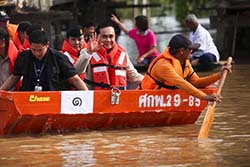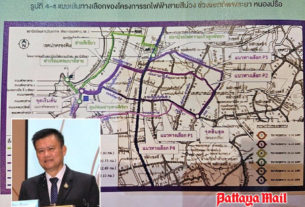Prayut splurge price tag dwarfs Yingluck’s
The government has proposed a raft of new national water management projects and wants to boost investment to a massive 900 billion baht under a 10-year plan.
The amount, which is more than double the price tag of the last government’s plan, has raised eyebrows from several corners, and they have requested the government disclose the details of the projects.
The plan was approved by the Water Management and Policy Committee, chaired by Commerce Minister Gen Chatchai Sarikulya, said Lertviroj Kowattana, director-general of the Royal Irrigation Department (RID), in his capacity as the committee’s secretary-general.
“In fact, more money and time are needed to tackle water-related problems, but this government ordered the projects to be completed in only 10 years, starting this year,” said Mr Lertviroj.
Prime Minister Gen Prayut Chan-o-cha inspects the flood situation at Ban Koh Kong in Kong Krailat district of Sukhothai in September, 2014. (Bangkok Post file photo)
He said 108.2 billion baht has been approved for executing projects this year and 135 billion baht for next year.
Projects in the first two years will mainly cover feasibility studies, designs and environmental impact assessments. They will focus on supporting water supplies for public use and consumption, including tap water systems for villages and the construction of kaem ling (monkey cheek) water-retention areas and reservoirs.
Mr Lertviroj said the urgent projects may not tackle major problems, but they could touch upon small-scale work. A total of 25 state agencies in eight ministries will work together under the plan, he said.
The sum of 900 billion baht has been greatly increased from the 350-billion-baht plan initiated by the Yingluck Shinawatra government, which was scrapped by the National Council for Peace and Order.
The five-year Yingluck plan was severely criticised because it would have been financed primarily by loans.
According to Mr Lertviroj, the Yingluck scheme focused on tackling floods along the Chao Phraya River basin, including for the development of floodways, which would have cost up to 300 billion baht.
The incumbent government instead aims to tackle broad water-related problems nationwide, including floods, drought and water quality, he said.
Investment under Prime Minister Prayut Chan-o-cha will mainly be financed by existing budgets, with as little as possible borrowed, he said.
Mr Lertviroj said the Prayut government has assigned state agencies to conduct feasibility studies and environmental impacts on the projects before calling bids.
However, some projects under the 350-billon-baht plan could be integrated in the new plan but they needed to be reviewed. If studies discover they are not worthwhile, they will be scrapped. One of the projects which will be included in the new plan is the floodway on the eastern side of the Chao Phraya River, which costs about 100 billion baht.
Asked how the government would help developers, particularly from South Korea, who won the bidding for the past government’s water-management scheme, Mr Lertviroj said the government is also concerned about relations between the two countries.
The government has ordered agencies to find ways to bring the firms to participate in the current administration’s projects, he said.
In 2013, Korea Water Resources Corp (K-Water) emerged as the biggest winner in terms of value in the bidding for the Yingluck government’s plan.
Meanwhile, the National Anti-Corruption Commission (NACC) said it will appraise the current plan for which the investment cost has soared.
“We are in the process of calling our first meeting, and it should be held within this month,” said Sirilaksana Khoman, an adviser to the NACC.
However, the NACC will need time to study details of the project with independent experts before it is able to assess it, she said.
“Commissioners will then evaluate whether the proposed budget is reasonable or not,” Ms Sirilaksana said.
The National Reform Council’s (NRC) water management reform committee chairman, Pramot Maiklat, said there must be concrete evidence of the project’s necessity, and details of the spending plan must be disclosed before moving forward.
Mr Pramot, who is a former RID chief, said he was surprised that the government proposed a 900-billion-baht megaproject without prior conclusive study and planning.
A more detailed outline of the strategy and budget should be posted for review, he said.
“It’s a matter of transparency. The people need to know if and how this money is going to solve their flood problems, but they need to know first and foremost because the construction of dams and floodways will affect their daily lives,” Mr Pramot said.
He also views the allowance as unnecessary for now because the RID has just received its annual budget for 2015.
“There is plenty of work left to do, and we should keep the promises we have already made before formulating more pledges,” he said.
Thailand Development Research Institute senior researcher Duenden Nikhomborirak agrees that more information is needed to assess the validity of the project.
She stressed that planners need to look at the larger picture before proceeding.
“The flood problem in Thailand is not caused by a lack of infrastructure but because our land is poorly managed,” she said.
Ms Duenden suggested there be a review and improvement of city and road planning first, as well as other land use components.
Source: http://www.bangkokpost.com/news/general/455087/govt-seeks-b900bn-for-water-plan



